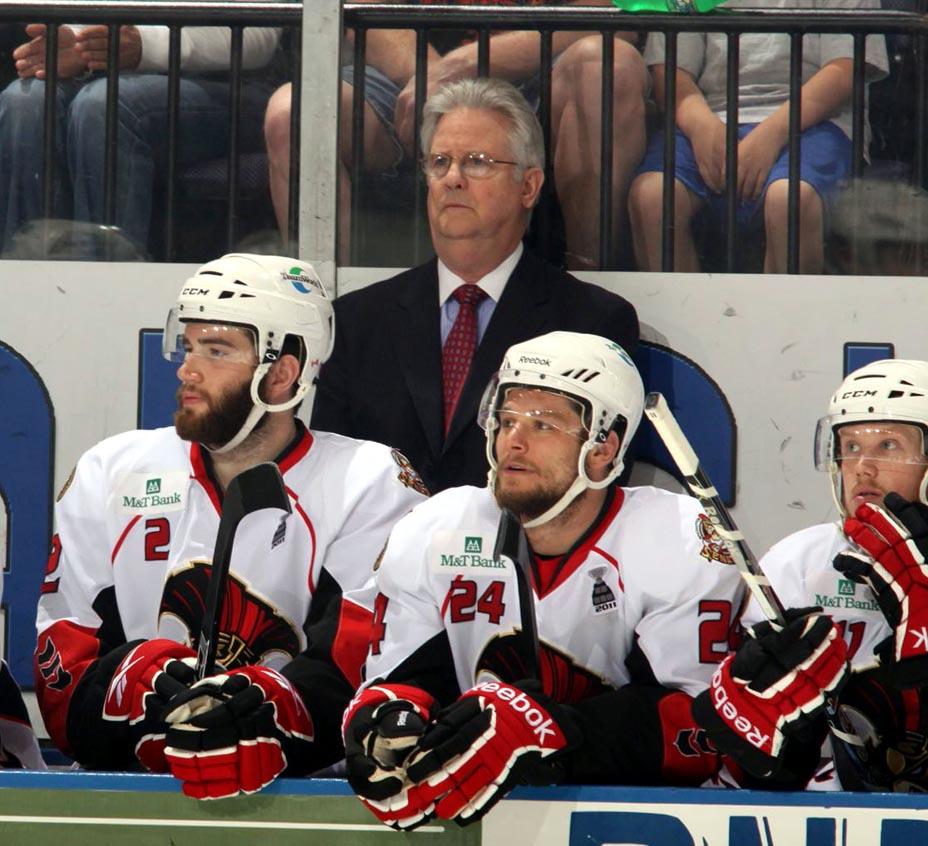by Kate Krenzer || AHL On The Beat Archive
For the fans, players and coaches alike, the anticipation of opening weekend in Binghamton was like no other. With so much to look forward to — watching the championship banner rise to the rafters commemorating the team’s 2011 Calder Cup victory, welcoming new players and seeing the familiar faces of members of last seasons’ team — this opening weekend was 38 years in the making, and every moment was exciting.
For one returning member of the Binghamton Senators 2010-11 squad, this was more than just another opening weekend.
As his name was called and he stepped out of the tunnel onto the ice during team introductions, assistant coach Steve Stirling was met with thunderous applause from the crowd gathered at the Broome County Veterans Memorial Arena.
A few short months ago, that moment seemed light years away.
* * *
The day was June 5. It was a warm, sunny Sunday in Binghamton, N.Y. The night before, the Binghamton Senators had defeated the Houston Aeros, 4-2, in Game 5 of the Calder Cup Finals in front of a sellout crowd to take a 3-games-to-2 advantage in the series.
The players and coaches met at the arena for a mid-morning workout. Steve Stirling took a handful of players out onto the ice for a light practice – the team’s "black aces" as well as a couple of players who chose to participate in the optional session.
Following the skate, the players went their separate ways for the afternoon as the coaches went to work preparing for Monday’s trip to Houston. It was then, as he sat in his office, that Stirling began to feel ill.
“It felt like indigestion. I went and got some antacids, which I would normally have for something like that and it just didn’t get any better,” recalled Stirling. “I didn’t have any chest pains, so I just thought it was a serious case of indigestion, which I had had hundreds of times in my life.”
When over-the-counter remedies failed to ease the discomfort, Stirling knew something wasn’t quite right. He picked up the phone and called his wife, Francesca, to explain that something wasn’t right and that he needed her to meet him.
“You know how you know your body? I just knew in my heart that something wasn’t right,” Stirling said.
Upon arriving at the rink, Francesca could tell something was terribly wrong. Stirling was pale and obviously didn’t feel well. She sprang to action, whistling across State Street to the City of Binghamton Fire Department.
“They came right over and put me in the ambulance, put me on an IV, gave me oxygen and asked me a million questions doing their prep work. At the hospital they ran some tests, then that night I was under the knife,” said Stirling.
The crew took Stirling to United Health Services Wilson Medical Center in Johnson City, N.Y. Following a series of tests, the physician came out and explained to Francesca that they believed they would have to go in and do an angioplasty. Some time later the physician brought her in to see X-rays that had been taken and explained that Stirling now required a triple bypass.
By time Stirling went into surgery, Francesca was joined in the hospital by familiar faces, B-Sens head coach Kurt Kleinendorst, his wife Deon, part-owner Bob Carr, and athletic therapist Glen Kinney among them. The Stirlings’ son Scott, who was two-and-a-half hours into a return trip to Ohio after visiting Binghamton over the weekend, turned around after learning the news.
“I had to be a rock for my family,” explained Francesca, as she reflected on that day. “This is a father who they (sons Todd and Scott) idolize, respect and want to emulate. Both the boys are coaches because of Steve. I had to be the one to say that he’d be okay.”
Later that night, the surgeon came out and explained that once they had gotten in they discovered they needed to do a quadruple bypass. Thankfully the surgery was successful and Stirling was resting comfortably.
The rest, as they say, is history.
The Binghamton Senators departed for Houston the following day. On June 7, they defeated the Houston Aeros, 3-2, to capture the Calder Cup in six games. Stirling had received the okay from his doctors to watch the game on TV.
“I kept dozing on and off through the first two periods. At the start of the third period, one of the nurses came in and said, ‘I think you better wake up and watch this. It’s 2-2 in the third.’ At that point I knew it was a 20-minute game. I woke up and saw the win. I didn’t sleep much after that because the excitement was so great!”
The moment their charter flight returned to Binghamton, the team boarded a bus to the hospital to celebrate with Coach Stirling, before sharing their championship with the rest of the city.
Once the celebrations quieted, bags were packed and the team had parted ways for the summer, many fans were left wondering, would Steve Stirling return to the Binghamton bench?
* * *
For Stirling and those that know him best, there was never any doubt he would rejoin the Binghamton Senators for the 2011-12 season.
“I didn’t waste too much time,” said Stirling. “Within three or four days of surgery they had me up and walking around. It was at that time that I asked, ‘What kind of rehab do I have to do? What kind of time frame do I have to get back on my feet, go back to work and be set for September?’
“The doctor’s response was that with September being three months away, unless I had a setback, that I would have no problem. So I knew then that if I did what the doctors said and followed orders that three months later I’d be ready to go and sure enough, I was ready to go.”
Kleinendorst knew Stirling had already spoken to his doctors about his return to the Binghamton bench. He checked in with Stirling throughout the summer, but had no lingering doubts that his right-hand man would be ready come September.
“When he left here, he had already shared his conversation with me that he had with the doctor. The doctor felt there was absolutely no reason why he wouldn’t be able to come back in September and do what he does. I was comfortable with that,” said Kleinendorst.
“We did talk off and on all summer long. The one thing I always asked was, ‘How are you doing?’ He’d always say, ‘I’m doing just fine.’ He always let me know he was excited for September. There was never any waver in his approach or his voice. I never questioned the fact that he would be back.”
Stirling diligently kept up with his rehab assignment, working with doctors near his home in Boston over the summer. At the end of the eight weeks he was in the best shape he had ever been in and was ready to return to work.
On Sept. 9, at the Bell Sensplex in Kanata, Ont., Stirling skated onto the ice for the first time in three months, prepared to lead a group of Ottawa Senators prospects in a workout before departing for the Toronto Maple Leafs Rookie Tournament in Oshawa.
“Before I got on the ice that day I was nervous. I hadn’t been on the ice for three months. It was almost like I was a pee-wee again or like my first training camp. I felt butterflies,” said Stirling.
“I was so nervous and thinking, ‘How am I going to do this? Am I going to be okay? Am I going to pass the pucks all right?’, but once you get out there and you get going, you get into the game and even after all these years it comes natural again. I was just like a little kid in a candy store.”
Now that Stirling has settled back into the regular season routine in Binghamton, defenseman Craig Schira reflects on his return.
“He’s awesome. He has been a big part of my career, personally. For the team, he’s with us every day. He coaches the ‘D’ on the back end and has become very close with a lot of us. It means a lot to have him back,” explained the third-year B-Sens blueliner.
“We’re looking forward to another good year with him behind the bench and he’s looking better than ever. He’s very energetic and enjoying life. Seeing him bounce back after that experience motivates us. He’s a very inspirational guy.”
Stirling is flattered that his players are able to take something away from his experience.
“Going through the surgery is part of what I needed to do for my health. I never thought about what going through that experience and then coming back to coaching would mean to the players. I am thrilled that they can pull something out of my experience for them.”
Likewise, Stirling himself returns to the rink more enlightened.
“After the first week of rehab I felt like one of the guys getting into shape again. Those eight weeks were a huge commitment. Three days a week I was on the treadmill at 7:30 in the morning ready to go. There were lectures that went along with it about the heart, nutrition and diet,” Stirling says. “The other four days a week I was committed to doing the same or more on my own at home. I now have a much better understanding of what we are asking the players to do in those three months in the summer time.”
Francesca (who has only missed half a dozen games that Stirling has coached over the years) is pleased to be settled back in Binghamton with her husband now, and recalled the doctor’s advice at the cardiac rehab near their home on Boston.
“The doctor turned to Steve at the last session and said, ‘Go out and have 20 more years of fun.’”
Stirling is sure to reach, if not surpass that milestone, whether it be on or off the ice.
“I feel exhilarated again,” Stirling says enthusiastically with a smile. “Now that I’m back, everything gets better every day.”






































